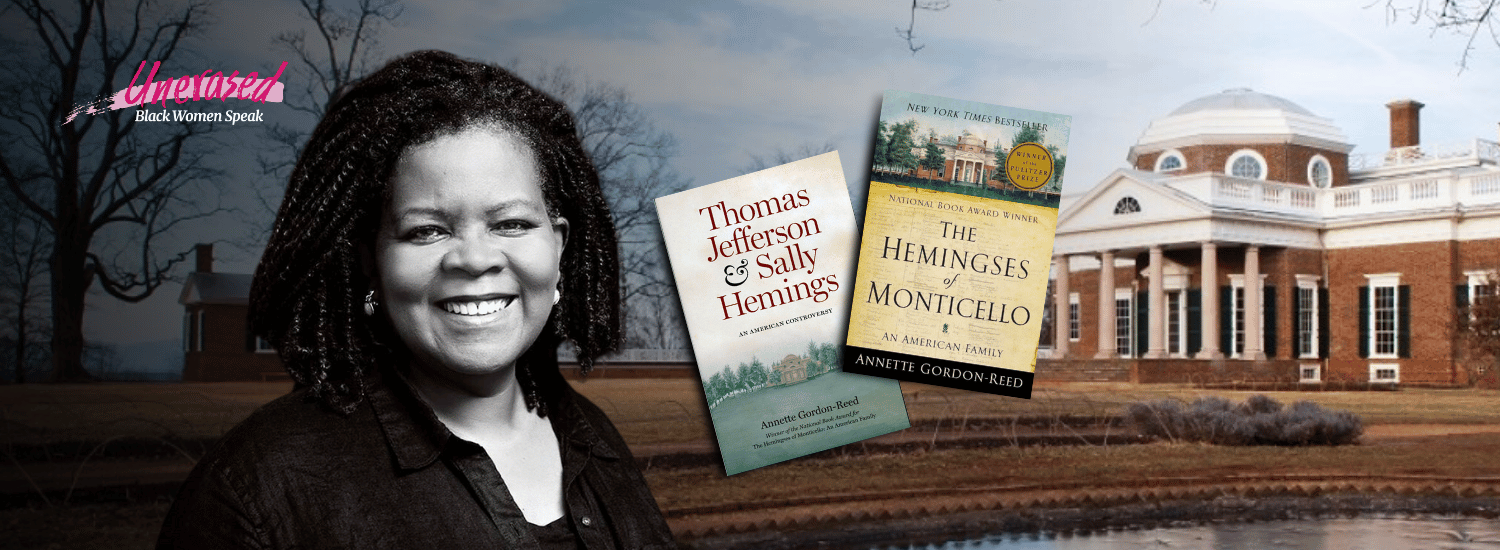By Tracy Chiles McGhee
Annette Gordon-Reed made history as the first Black student to integrate her elementary school in Conroe, Texas in the mid-1960s. Even as a youngster she held a fascination with the life and times of the third President of the United States who is also credited as the major framer of American democracy.
“We hold these truths to be self-evident, that all men are created equal, that they are endowed by their Creator with certain unalienable Rights, that among these are Life, Liberty and the pursuit of Happiness.” – Declaration of Independence
While other children were likely playing games, third grader Annette was questioning how Jefferson, an advocate of “liberty,” could also own people as property. That intellectual curiosity would inform Gordon-Reed’s formal education at Dartmouth College and Harvard Law school where she served on the prestigious Harvard Law Review.
Years later the historian and legal scholar would shatter the mythical sanctity of this nation’s most celebrated founding father at the same time she unerased the human dimension of enslaved women.
“Honesty is the first chapter in the book of wisdom.” – Thomas Jefferson
Through extensive research and critical analysis, Gordon-Reed’s groundbreaking work challenged and reshaped the narratives surrounding Jefferson, Sally Hemings, and the legacy of slavery. She painstakingly unravels the historical complexities and contradictions of American history that still plague our nation today.
In 1997, her debut book, Thomas Jefferson and Sally Hemings: An American Controversy marked a pivotal moment in America’s reckoning with its history of slavery. She surfaced convincing evidence of Jefferson’s paternity of Hemings’ six children, challenging long-held denials and forcing a reevaluation of Jefferson’s legacy and the lives of the enslaved people at Monticello.
Gordon-Reed elevated Sally Hemings, a mixed-race enslaved woman, as a central figure worthy of scholarly examination. Jefferson’s wife Martha Skelton Jefferson, is documented to be the half-sister of Hemings. Sally was the daughter of an enslaved African woman Betty and slave owner John Wayles who was also the father of Martha. Jefferson’s wife also bore him six children but died before his presidency. She is buried at Monticello with a tombstone inscribed with a loving message from Jefferson.
The location of Hemings’ gravesite is unknown although she too lived at Monticello. Pictures, writings and recorded interviews in the historical record were nonexistent yet the focused excavation of Gordon-Reed was able to provide insight into the process of unerasing Heming’s life story.
Her revolutionary book would garner 16 awards, including the 2008 National Book Award and the 2009 Pulitzer Prize in History, of which she was the first African American recipient. In her later seminal work, The Hemingses of Monticello: An American Family, she took an even deeper dive, satisfying the explorations of her third grade inner child.
For generations, there was a deliberate silence or denial about the relationships between enslaved women and those who owned them as chattel to be bought and sold, particularly when it came to preserving the reputations of historical figures like Jefferson.
Gordon-Reed redefined our understanding of these figures. So now when you visit Monticello, you will find the exhibit, Life of Sally Hemings, as well as other reflections that honor those enslaved by Jefferson. These observances are a poignant reminder of America’s greatest contradiction.
“Origin stories matter, for individuals, groups of people, and for nations. They inform our sense of self; telling us what kind of people we believe we are, what kind of nation we believe in.” – Annette Gordon-Reed (On Juneteenth)
Gordon-Reed is a tenured professor and the Professor of History at Harvard University. Two of her other works include; Jubilee: The Emergence of African-American Culture (2003) and Juneteenth (2020). She has received numerous accolades including a Guggenheim Fellowship in the humanities, a MacArthur Fellowship, and the National Humanities Medal.
Gordon-Reed’s phenomenal work powerfully acknowledges long-standing omissions, biases, and erasures. She gives testament that Black women’s humanity – distorted, devalued and erased – demands space in the historical memory. Through her scholarship and storytelling, she also gives voice to the fact that the Sally Hemings of history exist. And in so doing, she brings Black women out of the shadows and places them in the light.
Tracy Chiles McGhee is the author of the acclaimed novel “Melting the Blues” and Constituency Engagement Advisor for Unerased | Black Women Speak.



